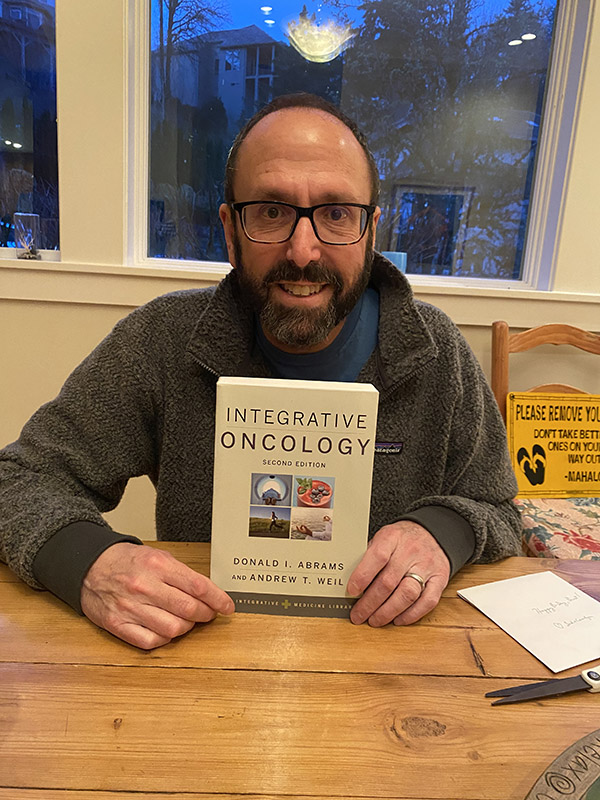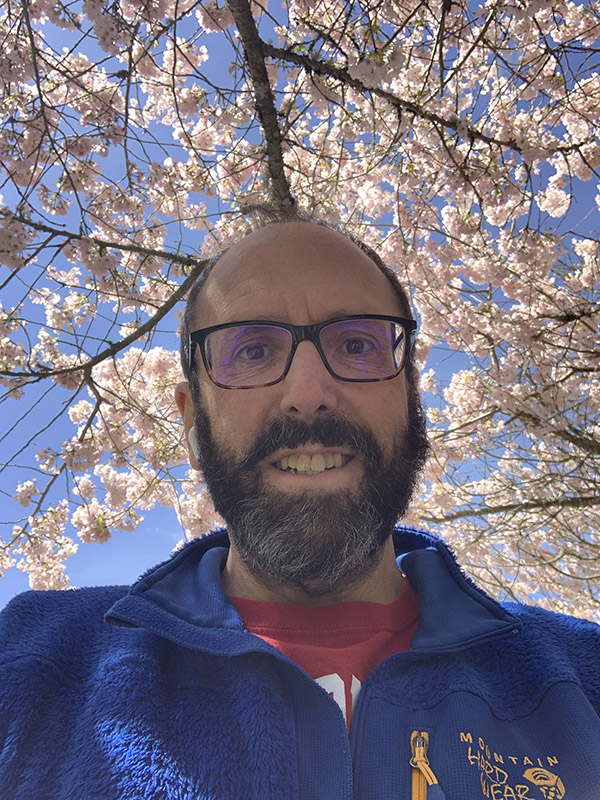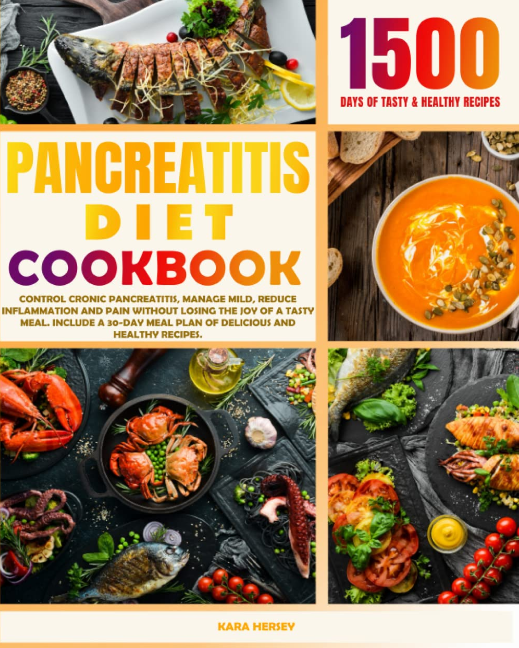

Burt Rosen Has Multiple Cancers,
But He Doesn’t Want Pity: He Wants to Change the Conversation.
Written By: Julia Brabant
May 2023
Date of Diagnosis: July 2022
Current Status: Still Receiving Treatment
Burt Rosen describes himself as “sick, not shy,” and he’s an open book for just about anyone out there facing similar medical struggles. Because he has two types of primary cancer, though, that’s a pretty short list – but the more he shares his own story, the more opportunities he has to help others like him.
That’s the realization Burt came to after his July 1, 2022 cancer diagnosis. It’s also the driving force behind his decision to volunteer time, donate samples and chronicle his day-to-day life via his blog, AdventuresWithCancer.com.
Burt admittedly wasn’t in the best of health from the outset. He has chronic Lyme disease and a history of ulcers. He’d also had two high-stress jobs within a three-year span and spent a lot of time traveling for one of them, and his stress levels were sky-high as a result.
While Burt had noticed his health declining beginning in 2018, it got progressively worse in the years that followed. In May 2022, he traveled to Boston for work as a marketing consultant. While there, he began experiencing uncharacteristic “brain fog,” and his condition worsened to the point where he found himself unable to email, make phone calls or even compose simple sentences.
“I just wasn’t myself,” he said. “And, honestly – it was way scarier than being told I had cancer.”
He flew home to Portland, Oregon, from Boston to get in front of his doctor, a naturopath he’d seen for 14 years. The naturopath helped the brain fog dissipate, but it returned in late June of that year, prompting a visit to the hospital. There, doctors determined the brain fog was the result of an ammonia buildup in his brain. The ammonia buildup occurred because his liver was malfunctioning, leading to a diagnosis of hepatic encephalopathy. Doctors also identified internal bleeding they said was the result of an unhealed ulcer.
Burt underwent several procedures to try to stop the bleeding. He had an upper gastrointestinal series, but it didn’t have the intended effect. When the gastroenterologist returned to Burt’s room to provide an update and recommend they try to stop the bleeding through interventional radiology, he whispered, “He knows he has cancer, right?” to Burt’s wife, Krista. Though in and out of consciousness, Burt was more coherent than he had been in previous days and was able to hear and understand the doctor’s words.
“I tend to do things in non-traditional ways,” Burt said, of how he learned he had cancer. “So, I guess it made sense.”
Burt began seeing a neuroendocrine (NET) specialist who started him on seven rounds of chemotherapy using Capecitabine and Temozolomide. The goal was to shrink his tumors to make them more operable. After seven rounds of chemo, Burt’s platelet counts went down, prompting doctors to stop his chemo and start him on once-a-month shots of Octreotide, a hormone drug used to treat certain types of cancer. In Burt’s case, doctors used Octreotide to stabilize his condition ahead of a major surgery planned for June 2023.
In March 2023, Burt had a CAT scan that revealed a spot on his lung. Suspecting Burt may have lung cancer, too, his doctor referred him to a thoracoscopic surgeon. The thoracoscopic specialist recommended Burt have the nodule removed via a video-assisted thoracoscopic surgery, or VATS, procedure, which involves inserting a small camera into the body through a hole in the chest wall.
Burt had the procedure April 19, 2023. Doctors were able to successfully remove the nodule, and follow-up tests determined that it was not cancerous and was, in fact, scar tissue.
He’ll now have a few months to build back strength before his June surgery, which involves removing one lobe from his liver and several tumors from the other lobe. If that goes well, doctors plan to perform a distal pancreatectomy to remove the tumor on the tail of his pancreas and additional procedures to remove his spleen and gallbladder.
If the initial procedure doesn’t go well, doctors will space out the remaining procedures, rather than try to do them all at once. While Burt will continue to undergo traditional treatment in the meantime, he’ll also continue to see a team of naturopaths, which he finds beneficial for both mind and body.
As part of his integrative treatment, Burt practices yoga, takes regular walks, meditates, eats a clean diet, has acupuncture and tries other alternative therapies and homeopathic remedies regularly.
Burt has become such an advocate for integrative oncology that he now volunteers for the Society for Integrative Oncology, a nonprofit that unites practitioners from multiple disciplines looking to improve the lives of people with cancer. He also volunteers with LACNETS and NCAN, two neuroendocrine tumor organizations that help NET patients gain access to resources that enhance their quality of life.
He also works at the hospital where he receives treatment, helping people with cancer and other serious conditions navigate their own patient experiences.
While Burt feels relief after finding out he doesn’t have lung cancer in addition to PNET and kidney cancer, he still plans to do everything he can to help patients with NETs, cancer or multiple types of cancer.
“I view myself like something of a human petri dish,” Burt said. “I’ll give scans, tissues, biopsies, interviews…all I want to do is make a difference.”
It’s all part of the conclusion Burt reached while undergoing two weeks of treatment at the hospital for internal bleeding and brain fog.
Hence his decision to volunteer his time for research and advocacy organizations. Burt also serves on several committees, acting as a moderator for the LACNETS Facebook group and sitting on the advisory council of the Neuroendocrine Cancer Awareness Network.
He also hopes to help other people with cancer by creating more of a conversation about the “experience” side of a cancer journey. Burt notes that, while there’s plenty of information out there about treatment options, it’s harder to find useful information about the other aspects of having cancer.
“Things like, ‘How do I pay for this?’ How do I tell my mother’?” Burt said. “There are a lot of aspects of having cancer that people don’t often talk about.”
Burt also referenced what he refers to as “The Pity Load.” Once someone who has cancer comes to terms with his or her own diagnosis, they then have to figure out how to help others around them do the same. Many people have similar responses to hearing someone has cancer – “I’m sorry,” etc. – but what Burt tries to do is show people that, because he doesn’t feel sorry for himself, they don’t need to feel sorry for him, either. In doing so, he helps remove the “Pity Load,” leading to more equitable, meaningful conversations.
“Just because that word ‘cancer’ is now part of my description, don’t write me off,” Burt said via his blog. “Under no circumstances do I want people writing me off. I am not writing myself off, so why should others?”
Burt also notes that he is mindful of how he refers to himself.
Burt is happy to talk with other people with pancreatic neuroendocrine tumors and other forms of cancer. He also plans to continue to help the greater cancer community by donating time, tissue samples and anything else he can to research and related efforts.
As part of his growing advocacy, he also hopes to help highlight just how much time, effort and love caregivers put into helping their loved ones manage cancer.
“What my wife had to go through…she didn’t sign up for this. Don’t forget that caregivers are human beings, too,” he said. “Caregivers need more love – being a caregiver is the toughest job in the world.”
Burt continues to chronicle his adventures with cancer via his blog.




What an awesome person and great article. You are such an inspiration to others and that’s what I want to be too! My yoga and fitness instructors tell me that I am. That makes me happier than anything. I want people to know even with cancer you can still exercise and your diet makes such a difference in staying strong. Thank you do much for this article. Would love to read more about him.
@donna thank you so much for the nice comment! you made my night! I am always happy to chat, if you want to connect just let me know how. All my contact stuff is at the bottom of my blog at https://www.adventureswithnets.com/. Also, I am very involved with the Society for Integrative Oncology (integrativeonc.org). You should check them out!
Wonderful article, Burt! Your continued sharing is inspiring and motivating. Especially wonderful to hear about the results of your recent lung surgery. Quick question from my hubby: As part of your diet, do you drink coffee (he’s drinking black coffee as I told him about this article)?
Hi Chela, thanks! I actually don’t drink coffee but I think I can if I wanted too. I drink something called Choffy which is cacao beans brewed like coffee. I drink it because it does have some health benefits but its coffee like. I am not sure for your husband but to my knowledge coffee is fine (I do have it on occasion and no one has told me not to and my body seems to deal with it well). Honestly, if he drinks it and feels fine I’d say go for it but thats just my personal, non-medical opinion!
Burt, Thanks for sharing your story. We pray for a healthy future for you . I am so impressed by your spirit and positive attitude which serves as great inspiration for others. I appreciate your openness and courage and I wish you all the best in your journey. We will be rooting you on from Texas. Tom & Diana Fitzgerald
Thanks Tom and Diana, I really appreciate that.